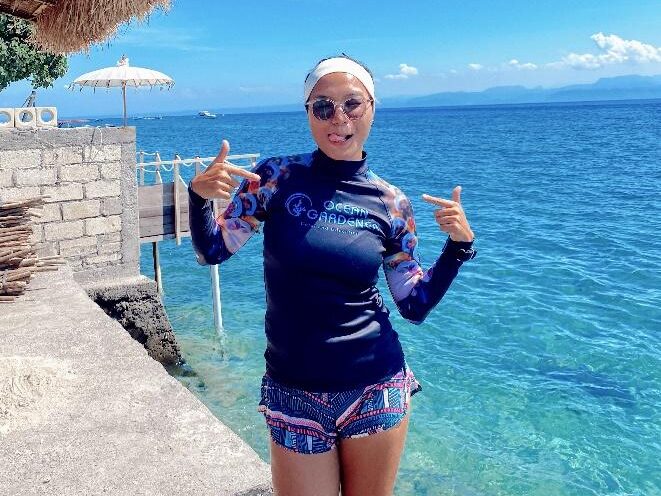Ivon was one of the 4 Indonesians selected by Ocean Gardener to receive our scholarship to take part in our Full Coral Restoration Certification course. She shares her experience spending the 4 weeks with other students learning more about corals, their restoration and applying these lessons practically during their dives in various locations around Bali, Indonesia.
Corals are not something new to me. My educational background in Marine Science and my current work with Gili Shark Conservation have made me very familiar with the existence and importance of coral ecosystems. It’s not just an object of study or a job for me. Corals have been the key starting point of my career journey. My passion for coral restoration activities, which are often referred to by the general public as ‘planting coral,’ stems from my admiration for their crucial role in maintaining the balance of the ocean. Their beauty and complex structures, as well as their close relationship with various other marine life, make me want to understand them more deeply.
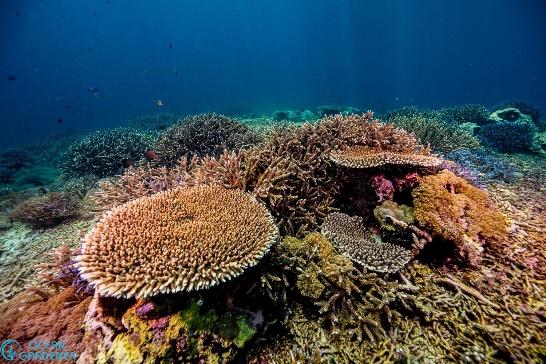
I was elated when I received the notification that I had been accepted into the program. Moreover, the support I received from my colleagues was also extraordinary. They encouraged me and said that this experience would be very beneficial, not only for me personally, but also for the conservation community we are currently involved in. With great enthusiasm, I began my new journey of learning about corals in greater depth with Ocean Gardener.
This training lasted for one month, divided into two main locations: Tulamben and Nusa Penida, each for two weeks. Each location has different ecosystem characteristics, which makes the learning experience richer and more diverse. Tulamben, with its relatively calm waters and many healthy coral spots, was an ideal place to learn the fundamentals of underwater ecosystem biology. Meanwhile, Nusa Penida, famous for its strong currents and extensive coral ecosystems, challenged us to apply what we had learned in more dynamic field conditions.
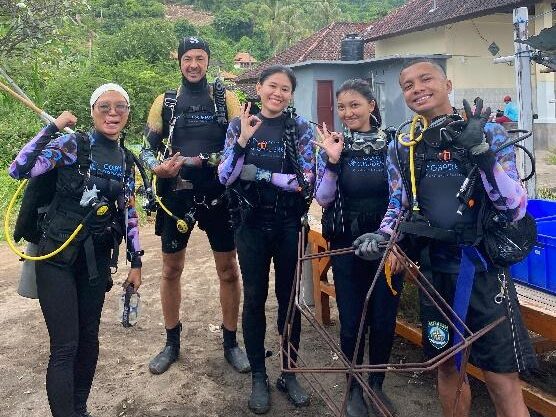
Every Monday to Friday were productive days filled with classroom sessions and dives. Meanwhile, Saturday and Sunday were our days off, which we used for rest, reflection, or exploration. The first week of training began with learning about coral biology. We learned about the body structure of corals, their reproductive systems, and the crucial symbiosis with zooxanthellae that allows them to thrive in clear, shallow tropical waters. One of the most interesting parts was the introduction to various coral genera, categorized based on their polyp size—large polyp stony corals (LPS) and small polyp stony corals (SPS). Through a combination of theory and direct observation at sea, I began to identify different types of coral with more confidence.
The second week focused on restoration in general. We were introduced to the history, objectives, and challenges of coral restoration efforts in various regions, with a focus on understanding the problems in Indonesia. We also learned about how restoration is not just about planting coral, but a complex process that requires a deep understanding of ecology. Discussions about community-based restoration approaches also opened my eyes to the fact that the success of conservation programs heavily relies on the involvement of local communities.
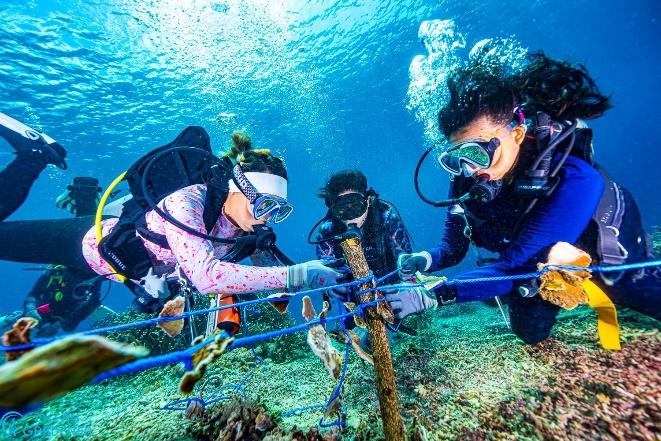
Moving into the third and fourth weeks, the training became increasingly intensive and detailed. We learned various transplantation methods and detailed restoration techniques, ranging from the use of metal racks and PVC pipes to direct fragging techniques onto natural substrates. We also learned about deploying rope nursery structures, a transplantation method that involves inserting coral fragments between the strands of a suspended rope. Furthermore, we learned to recognize and address coral diseases, a very important issue given the increasing pressure on coral reefs due to climate change and human activities. Not only that, but we were also taught field data collection methods, such as measuring growth rates, coral cover, and identifying species that serve as indicators of ecosystem health.
This entire training not only enriched my knowledge but also changed my perspective on coral. Now I no longer see them merely as objects of conservation, but as living beings that play an extraordinary role in underwater life. Coral reefs are home to thousands of species, protect coastlines from abrasion, and are even a source of livelihood for many coastal communities. Protecting them means safeguarding the future of our oceans.
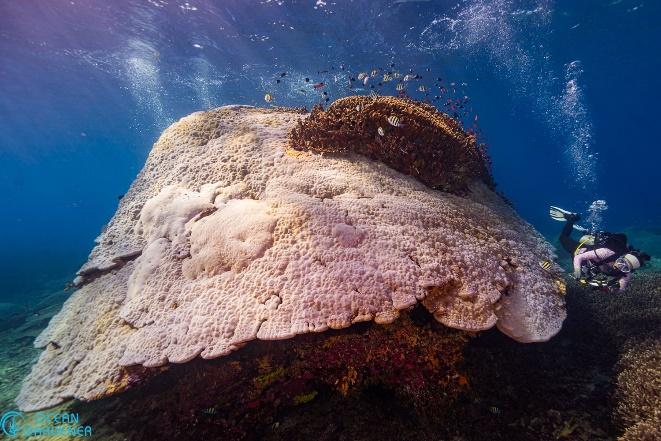
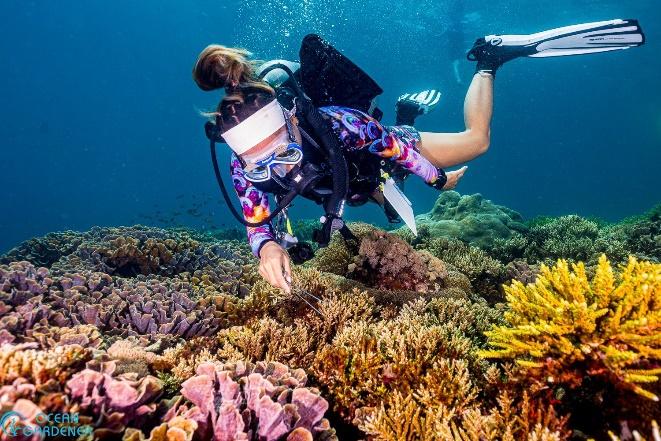
More than that, this training provided me with invaluable practical skills. I am now able to identify coral more accurately, understand how to choose appropriate restoration sites, and develop work plans based on data and ecosystem needs. I have also gained the confidence to share this knowledge with the public, especially young people who want to learn more about the ocean. This experience has also strengthened my determination to continue working in the field of conservation and to make environmental education a part of my personal mission.
Although one month felt short, this experience with Ocean Gardener was very memorable and amazing. The knowledge, science, and field experience I gained are priceless. I am very grateful to have been a part of this program, and I hope more young Indonesians will have similar opportunities in the future.
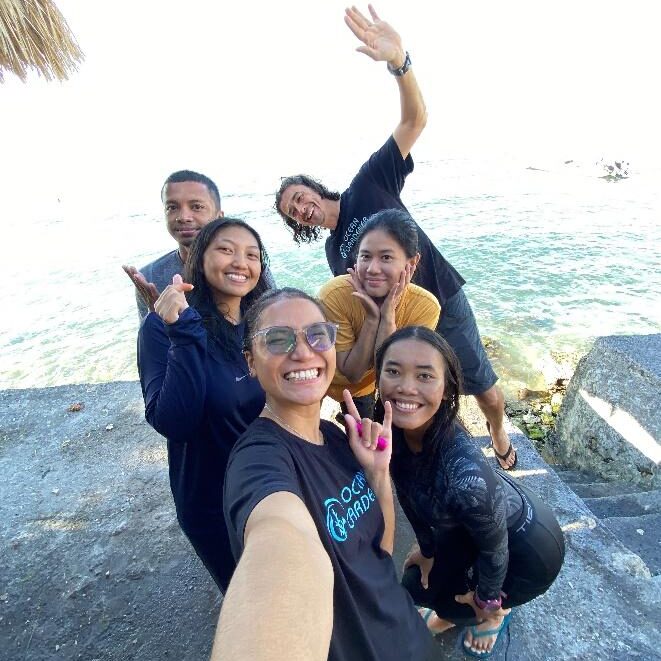
I believe that significant change always begins with small steps. And my small step of participating in this program has paved the way for a greater contribution to preserving Indonesia’s marine wealth.
Beyond the scientific and technical skills I learned, this experience also connected me with extraordinary individuals who share the same passion and vision. The trainers and other participants came from diverse backgrounds, but we were united by our love for the ocean and a strong desire to make a positive impact. Discussions, collaboration on field projects, and even simple moments of sharing stories after diving became cherished memories. This camaraderie has given me new energy and inspiration to continue on the path of conservation, even when challenges arise.
Moving forward, I am committed to applying what I have learned in my work area. I want to develop more interactive educational programs about coral, especially for the younger generation and tourists who visit our conservation areas. I believe that when someone truly understands coral, they will learn to love and protect it. With the knowledge I now possess, I not only want to be a restoration practitioner but also a bridge between science, the community, and the ocean itself.
